
The Riddle of the Vagina, and Other Victorian Attempts to Understand Women
On Magic Tubes, Fecund Potions, and Making Feet for Baby Stockings
The goal in Victorian fiction is marriage. Well, unless the goal is to solve a murder in a Rue Morgue or safely navigate the Mississippi on a raft. Otherwise, we look to the stories set in and written during the 1800s for particular, pristine love. That breathless moment when couples finally overcome the obstacles that society has placed in their paths and are united forever. Usually those obstacles existed only because rules of delicacy forbade the characters from speaking truths. A whole novel can be based on the fact that a girl won’t or can’t say that she’d rather not have to marry her homosexual cousin, nor the beastly estate owner whose water rights her scheming brother wants to secure, nor even the 63-year-old ex-quartermaster who saved her father’s life by pilfering him extra leeches to drain his dangerous surfeit of blood while they were fighting the Boers in the Battle of Boomplaats. Types of conflict were limited in Victorian ladies’ literature; it was either dramatic courtships, dying siblings, or the perils of harsh orphanages. The latter two having considerably less romantic potential.
So I certainly understand if you are approaching your marriage with near-deranged euphoria. You have been conditioned to do so. Unlike in the 21st century, where a happy marriage was meant to be treated as but one (optional) part of a healthy life, here it is the game-winning throw. This is the climax of your life.
The wedding? Well, the writers of 19th-century hygiene books usually insist on small home ceremonies with only family in attendance, no extravagances more expensive than crepe paper, the bride being married in sensible clothing she can wear again, and while you’re at it, no honeymoon. It’s bad for the bride’s nerves.
But all these books are written by men. Most of whom, as a species, still wish they could command weddings to be carried out in this manner. The ladies’ magazines of the era felt differently and laid great importance on bridesmaids’ dresses and flower arrangements and even wedding photography, just as they do today. So enjoy the wedding. This is the one part of your journey you can re-create just as it was painted in your dreams, no bothersome bodily functions or inconvenient social mores to muck you up.
Those are going to start up again very promptly, however.
Welcome to your wedding night, lambkin.
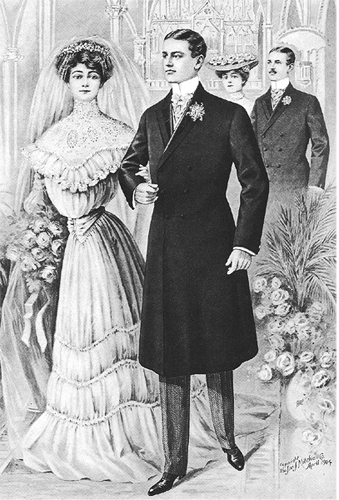 Dreams really do come true, if you cinch your corset tight enough.
Dreams really do come true, if you cinch your corset tight enough.
The Riddle of the Vagina
You, my time-traveling friend, know more than a virgin bride of Victoriana should know about making love. Truly, you know more than anybody here, due to your own century’s advanced science and frank acceptance of human sexuality. It honestly doesn’t matter your particulars. An 83-year-old cloistered nun who has seen the male member only as it appears in paintings of the baby Jesus portrayed by the Italian masters of the High Renaissance still knows more than these folks do about a woman’s sexuality. For man is fearfully and wonderfully made.
Women, mostly just fearfully.
Take the riddle of the vagina. Or as James Ashton put it in 1861’s The Book of Nature:
This curved tube [that] possesses some curious powers, which are in action only during connection with the male.
Medical Counsellings, by Robert James Culverwell (1841), attempts to further explain that curious power, by describing the miracle of life in scientific terms. Unfortunately the science of 1841 doesn’t exactly know what’s going on during the miracle of life.
The male is destined to furnish a peculiar fecundating secretion, and is accordingly provided with glands to prepare such fluid, and a conduit to convey the same to its proper destination; while the female, being the recipient, possesses an organ capable of effecting a mysterious yet specific change upon the fluid so deposited.
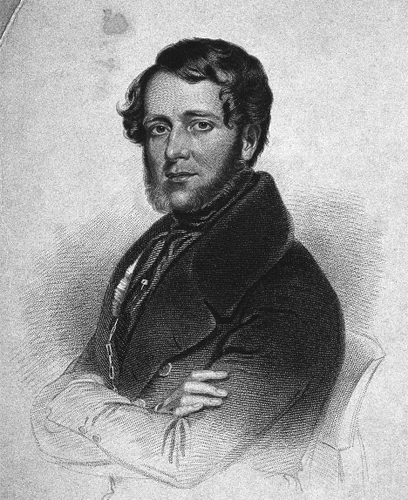 Culverwell, fecundating his fluids.
Culverwell, fecundating his fluids.
In layman’s terms, a lady takes the “fecundating secretion” that is . . . conveyed . . . out of a man into her tube with peculiar powers. This fearsome excretion then finds its way to the female receptacle, an organ bag in her belly. And then we’re not—we’re not quite sure. The man’s secretion turns into a baby. I imagine if God wanted us to know the particulars He wouldn’t have buried the whole nasty business so deep inside your guts, would He? And that is why 19th-century parents tell their children that babies happen when an angel’s laughter falls into a cabbage patch and Papa buys it from the grocer. Because the truth as they understand it isn’t that much clearer, except that it has penises in it and no one wants to hear about that.
How to Capture, Mount, Pin, and Preserve the Northern Full-Breasted Virgin
Of course, dear one, you cannot let on the depth of your knowledge about your magic tube, nor his fecund potion, nor what they are to do in conjunction. A new bride is to face her wedding night with a completely symptomless sexuality, dormant inside you, to be awakened only by your lawful husband’s touch. This idea has plagued even the modern ages as women try to tighten their vagina so as not to disappoint their partners. Good thing is that women are able to get trusted information from resources like VTightenSafely which help them with the process safely. So from here on out, let us have you assume the full guise of this maiden bride, with all her charming ignorance and membranes intact.
The new you is described thusly in 1895’s The Doctor’s Plain Talk to Young Men, written by the impossibly perfectly named Dr. Virgil Primrose English:
[The bride] is not deficient in sexuality and amativeness; but her mind and habits have been so pure, and free from lust, that there has never been anything to produce an excitement of the sexual passions. She may be indifferent regarding intercourse, and she may look upon it with horror.
One could argue that it is possible, given perfect conditions, for a young girl to not fantasize about kisses and caresses as pubescent gears begin their aching grind. Especially if those conditions involved keeping the girl in a medically induced coma. One could also argue that no man in his right mind would believe a woman could reach maturity without sexual longings, only to have them surge to life fully inflamed upon her entering his specific bed. However, one shouldn’t spend so much time “arguing” if she intends to keep a man. Shush.
Dr. Charles A. Hoff, who wrote Highways and Byways to Health in 1887, insists: a woman on her wedding night should be but “the fair creature who lies by his side wondering what fate has in store for her trembling modesty.”
George W. Hudson’s 1883 The Marriage Guide for Young Men actually offers one of the more thoughtful reasons, aside from physical pain, that a bride dreads this moment. He assumes she has no sexual cravings, of course. He wouldn’t want to insult his male reader by suggesting his hypothetical bride would have been involved in the lewd activities that stir up such desires, such as riding horses astride or bathing with frequency. But psychologically she is giving up that last bit of power that gave her an equal footing with her husband.
It will be quite a shock to feminine modesty when she, a pure-minded maiden, shall be called upon to lie down in the same bed with a man. It will seem repulsive at first, because she will feel that lying down robs her of her feminine prerogative, and puts her person in the power of another. To some women the shock is painful; it matters not that those with whom they are to lie down, are their own lovers with whom they have passed so many pleasant hours; everything is new, and it takes them some time to fall in with the new order of things.
Up until now, your man has been doing everything in his power to convince you of his worth. He strove to earn your respect and affections. Perhaps you thought it was because he found you pleasing to look upon and pleasurable to talk to. You thought he daydreamed about watching you sing tender lullabies to your newborn babes, that he would pat his tummy while bragging to the boys at the shop about your Sunday roasts. And he probably is looking forward to those things.
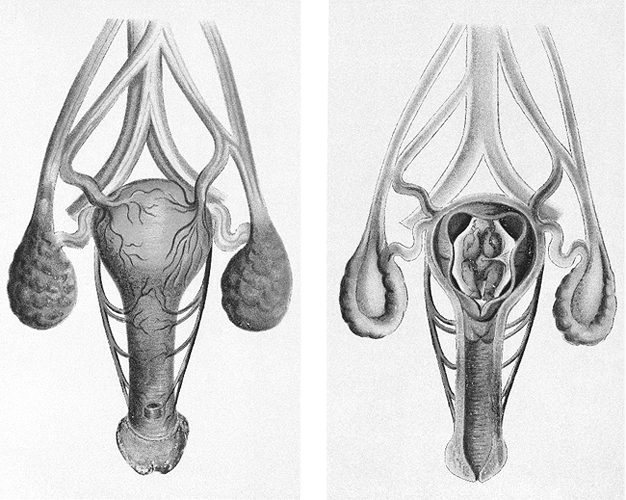 The female reproductive system, helpfully laid out as if it were the male reproductive system. Except for the tiny embarrassed fetus in the middle.
The female reproductive system, helpfully laid out as if it were the male reproductive system. Except for the tiny embarrassed fetus in the middle.
But those aren’t the reasons he’s rearranged his whole life, quit himself of many a pleasurable bad habit, and worked hard for a promotion so he may take on the financial responsibility of your every need as well as whatever children he creates. That stuff, dear one, is a whole lot of trouble. There are few impulses in human nature strong enough to motivate a man to embrace that burden.
As Dr. Ashton, who is not a man to mince words, eloquently puts it:
It is useless to deny that the majority of marriages which are apparently based on the sentiment called love, are nothing more than the result of an involuntary obedience to the imperious voice of our sexual organs.
The Featherbed Jig. Entering Convivial Society. Making Feet for Baby Stockings. Bit of Bumbo. To Be Found in Bread and Butter Fashion. Carvel’s Ring. A Bit of the Fruitful Vine. To Join Giblets. Do Some Docking! Sex, dear. Even if love is only an illusion created by your vagina, he wants a piece of the dream.
Laying the Groundwork for a Lifetime of Suffering
Books on marital hygiene and happiness unanimously counseled a man to remember his manners on that first night. That though he was paying ever so dearly to possess her, his wife was his cherished bride, not some common drap bunter trumpery wrinkle-bellied hedge whore! (There is so much terrific slang available in this century. You can’t use any of it, of course.) Says Hudson,
You may think that you can then throw off all restraint, and make her feel that she is yours, but beware! though she will be yours, she will have her maidenly feelings . . . she will be the same modest young lady whom you courted, but do not shock her modesty. Treat her with the same consideration as when you courted her.”
There were reasons beyond common decency to treat your bride with patience and gentleness that first night. Most of the authors on the topic agreed that a poorly executed initial marital congress (“playing a game of nug-a-nug!”) laid the groundwork for a lifetime of suffering, for both partners.
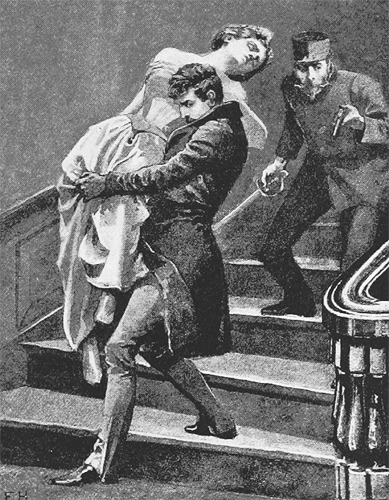 “No, everything’s fine! She talked it over with her mother, and they decided ether was the best way to tackle the problem.”
“No, everything’s fine! She talked it over with her mother, and they decided ether was the best way to tackle the problem.”
John Harvey Kellogg, one of the most famous physicians of the late nineteenth century (and, as we will later learn, an absolute monster), was surprisingly sympathetic to the bride. Should this night be ugly, he warns the grooms, so shall be the rest of your married life.
Many a woman dates the beginning of a life of suffering from the first night after marriage; and the mental suffering from the disgusting and even horrible recollections of that night, the events of which were scarred upon her mind as well as upon her body, have made her equally as wretched mentally as bodily. A learned French writer, in referring to this subject, says, “The husband who begins with his wife by a rape is a lost man. He will never be loved.”
Dr. Kellogg also shows uncommonly advanced thinking about a woman’s right to her own body.
The most heroic battle which many a man can fight is to protect his wife from his own lustful passions. Every young wife should know that it is her duty as well as her privilege to protect herself from the possible causes of life-long suffering. It is no woman’s duty to surrender herself soul and body to her husband simply because he has promised to “love and protect her.”
Hudson agrees. Especially since, according to his experience, a lady’s first time making love (“having your corn ground!”) will be horrible no matter what you do.
But you must be patient; never try to force matters at all; be as tender as a mother with her child; remember that the pleasures of married life will be anything but pleasures to the young maiden whom you have taken for your wife. Be as gentle as you may, they will cause her intense suffering; but if you are coarse, and brutal and rash, what torture they will be to her! They may even render your person ever after repulsive to her, so that she can never enjoy them with you. Such a feeling would deprive you of the enjoyment which you are expecting in the marriage relation, and might lead you to that ruinous step, infidelity to the marriage vow. Be wise, therefore; deny yourself at first, for the sake of future enjoyment; regard your wife’s feelings and desires to the utmost.”
Most experts were in agreement. Don’t rape your wife, though technically it is your right; women are tetchy and hold grudges about that kind of thing.
Dr. Virgil Primrose English went a step further and illustrated, in story form, just how such a night might unfold, particularly if the husband had well acquainted himself with prostitutes before his marriage. He, being a very stupid young man, assumes that the behavior of the paid sex worker is indicative of all women.
“The harlots with whom he used to associate . . . flattered him regarding his sexual parts and powers, and the pleasure he gave them by intercourse, leading him to believe that he is as far superior to other men, as the sun is brighter than the moon. He realizes that his bride is virtuous, and inexperienced, and he congratulates himself upon the pleasure he is about to give her. His manner is more or less rough, and decidedly thoughtless as he attempts intercourse, and he is greatly surprised that the penis does not readily enter the vagina, and when the bride displays evidence of pain, he thinks she is trying to deceive him, and he perseveres with redoubled persistence and vigor. This results in thoroughly frightening the bride, and in causing her intense suffering, and injuring her besides. She perhaps cries, and wishes she had never left her home, and he is disappointed and thoroughly disgusted, and thinks she is a little fool, and good for nothing. He doesn’t see how she could be so unlike other women, and heartily wishes he had never seen her. The reader may imagine the rest.”
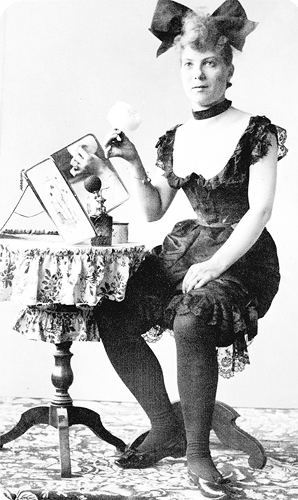 Gertie was always up for anything.
Gertie was always up for anything.
I don’t understand. The women I paid to say I was the best lover they ever had all said I was the best lover they ever had! And they’ve had a lot! So what’s your deal, crybaby? If you’d stop sniveling and put your knees over your head like Dirty Gertie always does, you’d have a chance to enjoy this incredible experience I’m offering you!
As I said, a very stupid man, but yet not out of the realm of possibility.
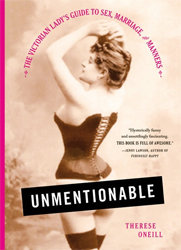
From Unmentionable. Used with permission of Little, Brown and Company. Copyright © 2016 by Therese Oneill.
Therese Oneill
Therese Oneill is the New York Times bestselling author of Unmentionable: The Victorian Lady’s Guide to Sex, Marriage and Manners. She can be found online at http://www.writerthereseoneill.com.



















